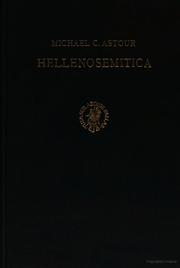
Hellenosemitica
An Ethnic and Cultural Study in West Semitic Impact on Mycenaean Greece
Astour, Michael C.
(with A Foreword by Cyrus H. Gordon)
In the beginning of the Heroic Age in Greece, Greek myths placed such characters as the Phoenician Cadmos in Thebes, the Phoenician Europa in Crete, the Egyptian Danaos in Argos. Herodotos reported on ancient Phoenician colonies in Boeotia and on the Aegean islands of Cythera, Thera, and Thasos. Thucydides wrote about Phoenician settlements in the Aegean isles. Rhodian historians ascribed the foundation of some of their cities and shrines to Phoenicians.
Was there any historical reality behind these reports?
Up to the second half of the 19th century, this question was usually answered in the positive. Though several attempts have been made to find cultic, mythological, and onomastic parallels between Greece and the Semitic East, still the data for achieving this purpose were inadequate. Too little was known of Semitic philology, and still less of Semitic literature, religion, and mythology at the time.
Astour's Hellenosemitica will undoubtedly be appreciated by those who have been attracted to the suggestion of West Semitic impact upon early Hellenic culture, but who have not been overly impressed by some of the ambiguous evidence offered heretofore.
The author's contention is that "the entire Mycenaean civilization was essentially a peripheral culture of the Ancient East, its westernmost extension" (pp. 357-58), and yet his strong assertion is also balanced by the judgment that "West Semitic influence was only one, though important factor in the formation of Mycenaean civilization, and ... Mycenaean survivals (including their Semitic components) were only one, though important factor in the formation of classical Greek culture" (p. xviii).
books.google.com


